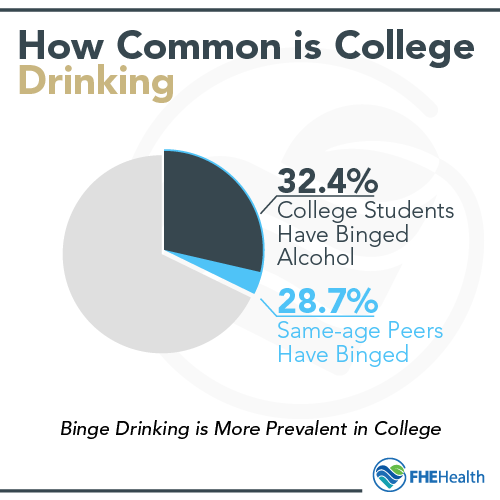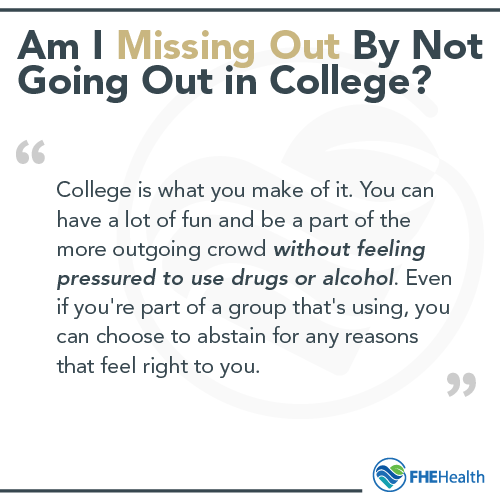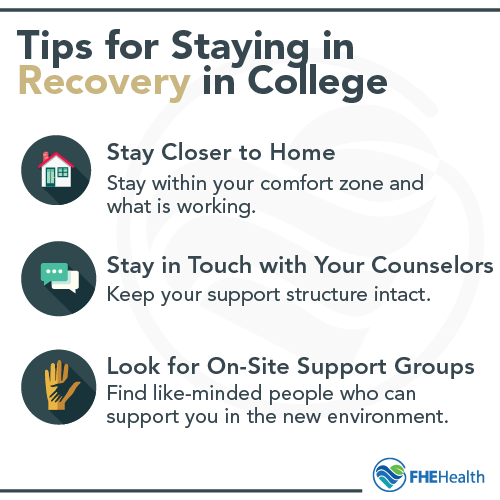
You want to know how to be sober in college. Whether or not you’ve used drugs or alcohol before, you recognize that education, and your future, probably don’t mix well with the use of substances.
Yet it can seem like you’re going to miss out on a lot of experiences if you aren’t partying every weekend. Is it possible to stay sober in college?
College Drug and Alcohol Abuse Is a Real Problem
 It’s not uncommon for young adults living on their own for the first time to experiment with drugs and alcohol. In many cases, it can feel like a rite of passage. However, most 18- to 22-year-olds understand that using and abusing drugs is highly dangerous and not worthwhile.
It’s not uncommon for young adults living on their own for the first time to experiment with drugs and alcohol. In many cases, it can feel like a rite of passage. However, most 18- to 22-year-olds understand that using and abusing drugs is highly dangerous and not worthwhile.
A National Institute on Drug Abuse survey found that 32.4% of college students had binged on alcohol. However, in same-age peer groups not in college, just 28.7% binged. Also, marijuana use among the college-age group has grown 4.9% since the 1980s.
Another key concern is amphetamine misuse, which has also grown significantly, including the nonprescription use of drugs such as Ritalin and Adderall. These drugs may help some students remain focused for longer periods of time.
It can seem as though the odds are stacked against you, but many opportunities are available to college students who don’t use.
Recognize the Impact of Drug Use in College
Every student should see the risks involved in using drugs or alcohol in college, which include:
- Poor performance on testing
- Difficulty concentrating, often leading to trouble studying and focusing in class
- Hangovers from alcohol use, which can make it hard to perform in sports activities
- Engaging in reckless behavior
- Difficulty achieving goals in all areas
Academically and socially, substance abuse can lead students on a path of hardship. It can be financially constraining, physically dangerous and life-altering to use drugs during college. A single overdose can ruin the chances of landing the ideal job or getting into a grad school of choice.
Am I Missing Out by Not Going Out in College?
 You can have fun without drinking alcohol. Many colleges are offering fun opportunities and social activities — often created by the students themselves — that don’t include the use of substances.
You can have fun without drinking alcohol. Many colleges are offering fun opportunities and social activities — often created by the students themselves — that don’t include the use of substances.
- Engage in school-sponsored events. Many schools have traditions that don’t involve the use of drugs or alcohol.
- Get involved with youth groups that interest you.
- Hang around people who share your views on drug and alcohol use.
- Get involved in volunteer groups. While you may think that sounds like work, it may lead to opportunities to take trips around the world.
- Create your own fun by leading a group activity or starting a club.
- Focus on sports and staying fit.
- Consider any religious organizations at your college that may offer you the atmosphere you enjoy.
College is what you make of it. You can have a lot of fun and be a part of the more outgoing crowd without feeling pressured to use drugs or alcohol. Even if you’re part of a group that’s using, you can choose to abstain for any reasons that feel right to you.
In Recovery? How to Stay Sober in College
 Learning how to be sober in college when you’re in recovery can be a bit more challenging. If you’re just out of active drug or alcohol addiction, you’re especially vulnerable to what’s happening around you. For that reason, you really need to invest in additional solutions to help you.
Learning how to be sober in college when you’re in recovery can be a bit more challenging. If you’re just out of active drug or alcohol addiction, you’re especially vulnerable to what’s happening around you. For that reason, you really need to invest in additional solutions to help you.
Stay Closer to Home
If you’re concerned about living on campus and being exposed to drugs and alcohol in recovery, don’t do it. Choose a college or university that’s closer to home. Live at home or choose an off-campus apartment. This gives you more freedom to walk away from situations that aren’t right for you while still enjoying college life.
Stay in Touch with Your Counselors
Even when you are away at school, it’s wise to remain in contact with your drug and alcohol treatment counselors. Be sure your mentor understands what you’re going through.
It’s never easy to simply walk away from tempting situations. Having someone to call when you need to can make a world of difference.
Look for On-Site Support Groups
You’re not alone. It’s not uncommon for people in college to have faced challenges similar to yours. Many college-based programs can help you stay in recovery and avoid a relapse.
Ask about these groups when speaking to your college counselor. They want you to succeed too.
Enjoying College Without Alcohol and Drugs Starts With a Plan
Whether you’re worried about using for the first time or want to stay sober, consider these actions before heading off to school.
- Set goals for yourself before you leave home. Aim to connect with your mentor once a week initially to ensure you’re in a good space.
- Recognize your triggers early on. If you know that peer pressure is a problem for you, try to engage in activities where you’re sure there won’t be substance abuse.
- Get involved, from the first day, in student activities and the college itself. Often, these programs keep you busy so you don’t have to worry about or think about drug use.
- Get out with new friends. Making friends that understand your situation and are willing to support you is possible.
- Use your understanding of substance abuse to help others. Supporting others can help you maintain your own sobriety.
You’re Not Alone in This – Let Us Help You
Not drinking alcohol or doing drugs in college is hard to do, but help is available. At FHE Health, our compassionate counselors are just a phone call away from providing you with the support you need. Call us at (833) 596-3502 to talk to someone anytime, day or night.






